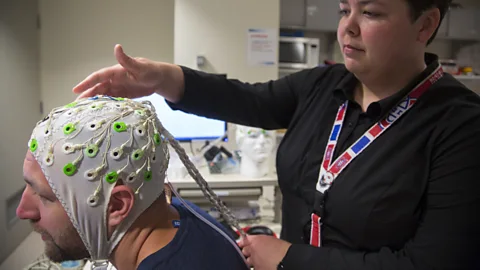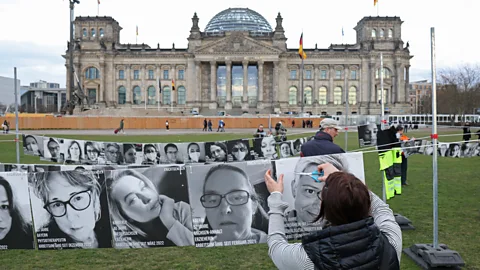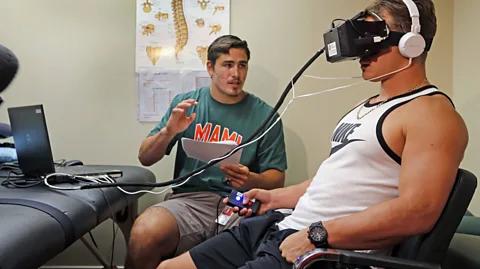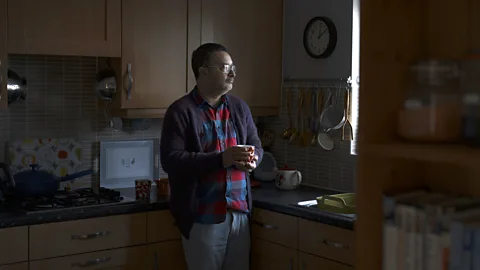 Getty Images
Getty ImagesThere are remarkable similarities between the two syndromes — and scientists hope this connection could help solve the mysteries of both.
In the middle of the year 2023, neurologist Ioannis Mavroudis was working on his pending cases when he had a revelation.
As a concussion specialist who spent many years in his post at Leeds Teaching Hospitals NHS Trust, Mavroudis had found himself dealing with an increasing influx of patients with long Covid – a loose grouping of health problems that develop following a Covid-19 infection.
Many of these patients were presenting with a variety of neurological symptoms. Mavroudis noticed that their symptom patterns – fatigue, sleep disturbances, sensitivity to light and noise, exercise intolerance and memory and concentration problems – were surprisingly similar to symptoms associated with another mysterious long-term condition called post-concussion syndrome or ‘long concussion’.
“I work with athletes and I have seen a number of professional rugby players suffer from it,” says Mavroudis. “Like long Covid, some people suffer from it for many years.”
Mavroudis believes that post-concussion syndrome is related to the energy demands placed on brain neurons as a result of a head injury, which is something that occurs to the brain as a result of trauma. has been discussed in the research papers. They say, “Early on in a brain injury, neurons require more energy than the brain can provide, leading to fatigue, and then they get caught in this vicious cycle.”
Mavroudis was so astonished by this overlap that he mentioned it in a scientific review of post-concussion syndrome. Published in May 2023. But he wasn’t the first to make this observation. Half a year ago, a group of concussion experts at the University of Denver in Colorado noted this. Also published Their findings on the seemingly unlikely similarities between the two conditions.

 Getty Images
Getty ImagesWhen they applied standard concussion tests to Long Covid patients, researchers at the University of Denver observed the same telltale problems. One problem was problems tracking eye movements, as assessed through the King-Devick test, which measures the ability to scan numbers on a card in a zig-zag manner from left to right under time pressure. Results from balance and spatial reasoning exams also suggested that the patients had experienced a traumatic injury to the brain.
a curious group suggested He said the same diagnostic techniques used for concussions could provide a much-needed way to assess the progress made by these patients. He argued that techniques that stimulate the vestibular system – the sensory network in the brain that coordinates the position and movement of our head in space – could be tried as a new treatment approach for long Covid.
But the connection was no surprise to Herbert Renz-Polster, a researcher at the University of Heidelberg who has spent years trying to understand a parallel disease, myalgic encephalomyelitis, also known as chronic fatigue syndrome (ME/CFS).
behind the brain stem
While chronic infections are thought to be one of the major triggers of ME/CFS, Up to 75% of patients experiencing an infection-like condition before the start of your illness, studies It has also been reported that many patients have hypermobility between the skull and the upper spine. It is possible Due to ligament weakness or hereditary conditions such as Ehlers Danlos syndrome, which cause abnormalities in the connective tissues.
“A very large proportion of ME/CFS patients have abnormalities in the way they support their head,” says Renz-Polster.
According to Renz-Polster, these cases could provide valuable information about what happens in post-concussion syndrome. In both incidents, he believes problems arise from compression of the brainstem, the stalk-like structure that connects the brain and spinal cord. This can be caused either by the skull moving too much and falling backward, or by a forceful impact.
“The brainstem coordinates connectivity in the brain,” says Renz-Polster. “So, when it’s suppressed, it causes a complete disruption in the connectivity and information flow between the different centers that underlie our brain function.” He explains that this is why ME/CFS patients can have difficulty coping with any kind of stress, whether it’s psychological, muscular, or cognitive. “Every kind of stress leads them to dysfunction,” he says.
In recent years, research has also shown that the brainstem is particularly vulnerable to various neurotrophic viruses, which are able to reach the brain. Studies have shown that ACE2 receptor A protein used by the SARS-CoV-2 virus is relatively abundant in the brainstem compared with other regions, while Autopsies Virus RNA and proteins have also been found in this part of the brain. It is also believed to be particularly vulnerable to damage from excessive immune activation that can be triggered by infection.

 Getty Images
Getty ImagesRenz-Polster’s theory is two-pronged. He believes that an initial trauma – whether from a forceful impact or a viral infection – can potentially disrupt brain activity as well as the delicate membrane separating the brain from the bloodstream. This allows inflammatory molecules to damage the lining of the many tiny blood vessels that nourish the brain, which in turn has a negative effect on mitochondria, the many tiny energy factories that power every cell in the body, from neurons to muscle cells.
“Mitochondrial dysfunction is a fact in all of these conditions.” [Long Concussion, ME/CFS],, he says. “But I don’t think that’s the primary issue. The mitochondria themselves are fine, but their supply has stopped. And that’s why patients with long Covid, ME/CFS and post-concussion syndrome can see days when they feel fine, and then they collapse. It’s because the mitochondria are not being supplied properly,” he says.
New treatment paradigms
Although these explanations are still only theories, Renz-Polster says it should be possible to prove them using more advanced scanning techniques, e.g. Ultrahigh-field MRIThis approach may allow investigators to examine patients’ brain stem in more detail, which has always been difficult due to its relatively small size and anatomical complexities.
“For a long time, the brain stem was an area that couldn’t be studied because it’s in a different location every time you breathe,” says Renz-Polster. “But you can’t tell a patient not to breathe.”
Renz-Polster is particularly fascinated by the potential of psychedelic drugs such as ibogaine, psilocybin and ketamine to modulate the default mode network, a group of brain regions including the brainstem. Earlier this year, Small study found that a combination of ibogaine and magnesium improved brain functioning in US military veterans with traumatic brain injury, while some Actual report There has been an increase in the number of long Covid patients benefiting from MDMA and psilocybin therapy.

 Getty Images
Getty Images“Ibogaine and psilocybin work on the default mode network, which is involved in the coordination of all brain functions,” says Renz-Polster. “I would very, very much support trying these drugs for long COVID.” (However, this should not be tried without medical supervision and approval—don’t try it at home.)
Other patterns have also been observed in patients with ME/CFS, long Covid and those severely injured due to traumatic brain injury. reactivation of dormant virus Those that become permanently embedded in the genome, such as the herpes viruses, which can cause cold sores and genital herpes, or the varicella zoster virus, which causes chickenpox and shingles. Once they reawaken, it is thought they can cause inflammation.
Renz-Polster suspects that in all three cases, this viral reactivation may contribute to some of the ongoing symptoms, such as fatigue and brain fog. While there’s no surefire strategy for silencing these viruses once they’ve been awakened, ideas such as administering the BCG vaccine for tuberculosis have proven effective. has already been searched As a way to prevent reactivation of various herpes strains, with some success.
With a lack of effective treatments and millions of people worldwide affected by these conditions, researchers hope that understanding the crossover between long concussion and long Covid will provide answers that can help everyone affected.
“I am optimistic,” says Mavroudis. “I believe there will be some treatment that can change the way the brain works in these patients and help them cope with sleep problems, fatigue, and exhaustion.”
Disclaimer : The content in this article is for educational and informational purposes only.





